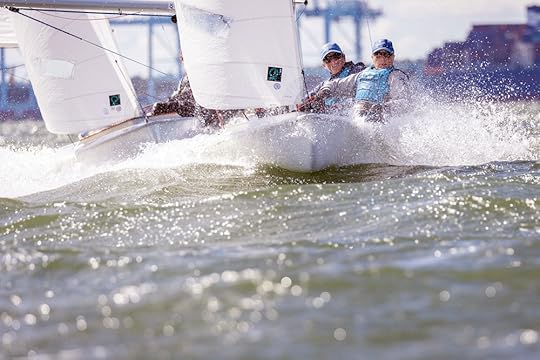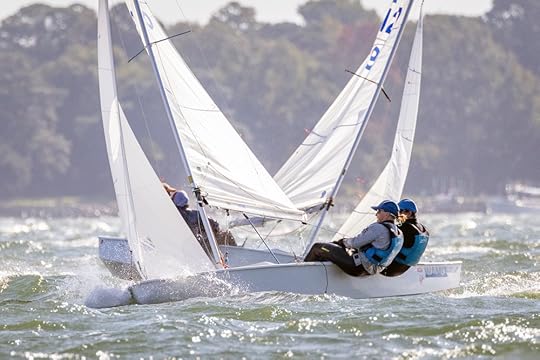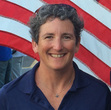Why a Voiceless “Victory” Makes me So Proud
A few weeks ago, I sailed my last Snipe race of 2023—without a voice. I’ve written about voice before, but this time I mean it quite literally: I had laryngitis.
And in more than 30 years of top-end one design racing, I consider it one of my best finishes ever.
By the usual standards, crossing the finish line in third could be called a failure. Halfway through the race, we were winning—both the race and the North American Championship—so dropping two boats on the second lap hardly constitutes what legendary coach Gary Bodie would call a positive delta. But I’m really proud of finishing second overall, because on that particular day Kim Couranz and I had to use everything we’d learned in thirteen years of sailing Snipes together.
 Reaching in heavy air requires perfect trimming and body positioning to keep the Snipe planing—and to avoid wiping out.
Reaching in heavy air requires perfect trimming and body positioning to keep the Snipe planing—and to avoid wiping out. We’d posted two first place finishes on the opening day of the regatta, and even after a much windier day two we led the results by one point going into the final day. As one of the lightest teams, we knew Sunday’s big breeze forecast would be a BIG challenge. Especially when I woke up that final morning without my voice, a key communication device.
On Friday, we’d joked about how we didn’t really need to talk anymore; after so many years as a team, just a grunt at the right time would be all that was necessary to convey what each of us was trying to say. But that Sunday, I couldn’t even grunt; I could barely whisper. And as we sailed out in a building northwest breeze, we knew the wind noise would overwhelm anything less than a shout.
Here’s why I’m so proud of how we sailed, and what can be learned from it.
We prepared wellJust before we left the dock, I noticed the tiller extension universal was halfway split through—and, though it would’ve been easy to put my blinders on and ignore it, instead I made the time to replace it. We left the dock a little later than I preferred… but an hour later when I tugged on the tiller extension hard to keep the boat from capsizing downwind, it stayed attached.
We kept doing USWe have so many hours in a Snipe together that Kim usually knows what I’m going to do next even before I quite realize it myself, so to compensate for my lack of voice she stepped up her own excellent communication to something approaching redline. Instead of waiting for me to speak, she’d ask, “Are you thinking of tacking?” That timely question would be followed by a glance aft, so I could convey my answer with just a nod.
We used all of our hard-earned Snipe wisdom and fitnessIn the biggest puffs, we had to flog both sails upwind to keep the boat from flipping. Even if I could speak, I wouldn’t have communicated that need fast enough; Kim had to feel for herself when flogging the jib was necessary, and because she never cleated the sheet her response was instantaneous. In those conditions, the jib is key to boat balance. So as soon as the puff faded, she had to pull it back in again—which required much more strength than the usual Sunday Snipe sailing promised in the brochures.
 When we have to luff jib AND main upwind, it’s freakin’ windy. We never stopped racing—
When we have to luff jib AND main upwind, it’s freakin’ windy. We never stopped racing——even when a heavier team ground us down upwind. Even when we suffered a fatal pole failure that could’ve easily spiraled down into other calamities. We did lose one more boat downwind… but held onto second overall. And I’ve now added a new item to my very large Snipe bag of rigging tricks: the plastic ends should always be GLUED into the aluminum tube…
As sailboat racers, we never know when all of our skills—both physical and mental—will be required to succeed. All we can do is keep working out, continue to accumulate and share knowledge, and then be ready to do our thing on the biggest days—even when we wake up without a voice.
PS: Thanks to Ben Schill for the photos!
The post Why a Voiceless “Victory” Makes me So Proud appeared first on Carol Newman Cronin.



